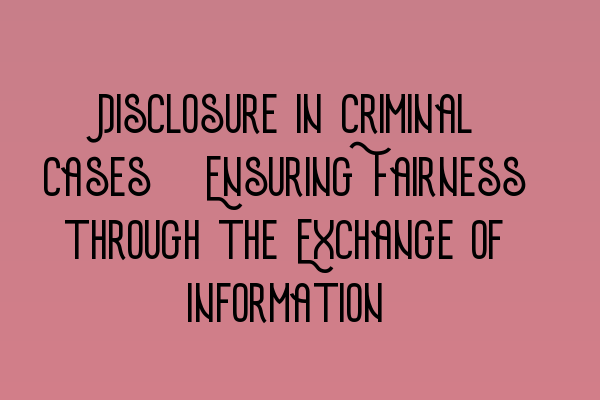Disclosure in Criminal Cases: Ensuring Fairness through the Exchange of Information
When it comes to criminal cases, one of the fundamental principles of justice is ensuring fairness. In order to achieve this, it is crucial that both the prosecution and the defense have access to all relevant information pertaining to the case. This process is known as disclosure.
Disclosure refers to the exchange of information between the prosecution and the defense in a criminal case. It is essential for both sides to have access to all relevant evidence, as it allows for a fair and transparent trial. Without proper disclosure, the balance of justice can be compromised.
The importance of disclosure cannot be overstated. It ensures that the defendant has the opportunity to know and understand the evidence against them, enabling them to mount an effective defense. It also allows the prosecution to fulfill its duty of disclosing all relevant evidence, even if it is unfavorable to their case.
In recent years, there have been several high-profile cases where failure to disclose relevant information has led to wrongful convictions. These cases have highlighted the need for robust and effective disclosure processes to safeguard against miscarriages of justice.
The process of disclosure begins with the initial collection of evidence by the investigating authorities. This evidence includes statements from witnesses, forensic reports, CCTV footage, and any other relevant information. The prosecution is then responsible for identifying and disclosing all relevant evidence to the defense.
As technology continues to advance, the amount of digital evidence in criminal cases is increasing exponentially. This includes data from mobile phones, computers, social media accounts, and other electronic devices. It is essential that prosecutors are well-equipped to handle this digital evidence and ensure its proper disclosure.
To ensure fairness and transparency, the Criminal Procedure Rules provide guidelines for disclosure in criminal cases. These rules outline the responsibilities of both the prosecution and the defense in the disclosure process. They encourage early and full disclosure of all relevant evidence, promoting a fair trial for all parties involved.
However, despite these guidelines, issues with disclosure still persist. Delays in disclosure can lead to unnecessary adjournments and increased costs. In some cases, crucial evidence may be inadvertently or intentionally withheld, undermining the integrity of the trial.
To address these challenges, the criminal justice system is actively working towards improving the disclosure process. One such initiative is the use of technology to streamline and automate the disclosure process. This includes the use of secure digital platforms for the exchange of evidence, making it more efficient and accessible.
In addition, training and awareness programs are being implemented to educate prosecutors, defense lawyers, and investigators about the importance of disclosure and the proper handling of digital evidence. These programs aim to improve understanding and cooperation between all parties involved, ultimately leading to a fairer and more efficient disclosure process.
As aspiring solicitors prepare for the Solicitors Qualifying Examination (SQE), they must also familiarize themselves with the principles and procedures surrounding disclosure in criminal cases. Understanding the importance of disclosure and the challenges associated with it will help them navigate these complexities effectively.
To delve deeper into the topics related to criminal law and practice, consider reading the following articles, which provide valuable insights into various aspects of the legal profession:
– Demystifying the Solicitors Qualifying Examination Format: This article offers a comprehensive overview of the format and structure of the SQE, providing aspiring solicitors with essential information for their exam preparation.
– LLC Formation Made Simple: Step-by-Step Guide for UK Entrepreneurs: For those interested in setting up a limited liability company (LLC) in the UK, this step-by-step guide provides valuable information and practical advice on the formation process.
– Business Regulations in the UK: A Comprehensive Overview: This article explores the various regulations and legal considerations that entrepreneurs and business owners need to be aware of when operating in the UK. It covers topics such as taxation, employment law, and data protection.
– Preparing for the SQE Exam: Strategies and Resources for Success: As the SQE represents a significant milestone on the journey to becoming a solicitor, this article offers valuable strategies and resources to help aspiring solicitors effectively prepare for their exams.
– SQE Workshops and Webinars: Accelerate Your Exam Preparation: To complement their exam preparation, aspiring solicitors can benefit from attending workshops and webinars specifically designed to enhance their knowledge and skills in preparation for the SQE.
Disclosure in criminal cases is a crucial component of a fair and just legal system. It ensures that all parties have access to relevant information, promoting transparency and enabling effective defense representation. By continually improving the disclosure process and raising awareness about its importance, we can strive to uphold the principles of fairness and justice in criminal proceedings.
If you have any questions or require legal assistance regarding criminal law and practice, please do not hesitate to contact SQE Criminal Law & Practice Law UK. Our team of experienced solicitors is here to provide you with the expert guidance and support you need.
